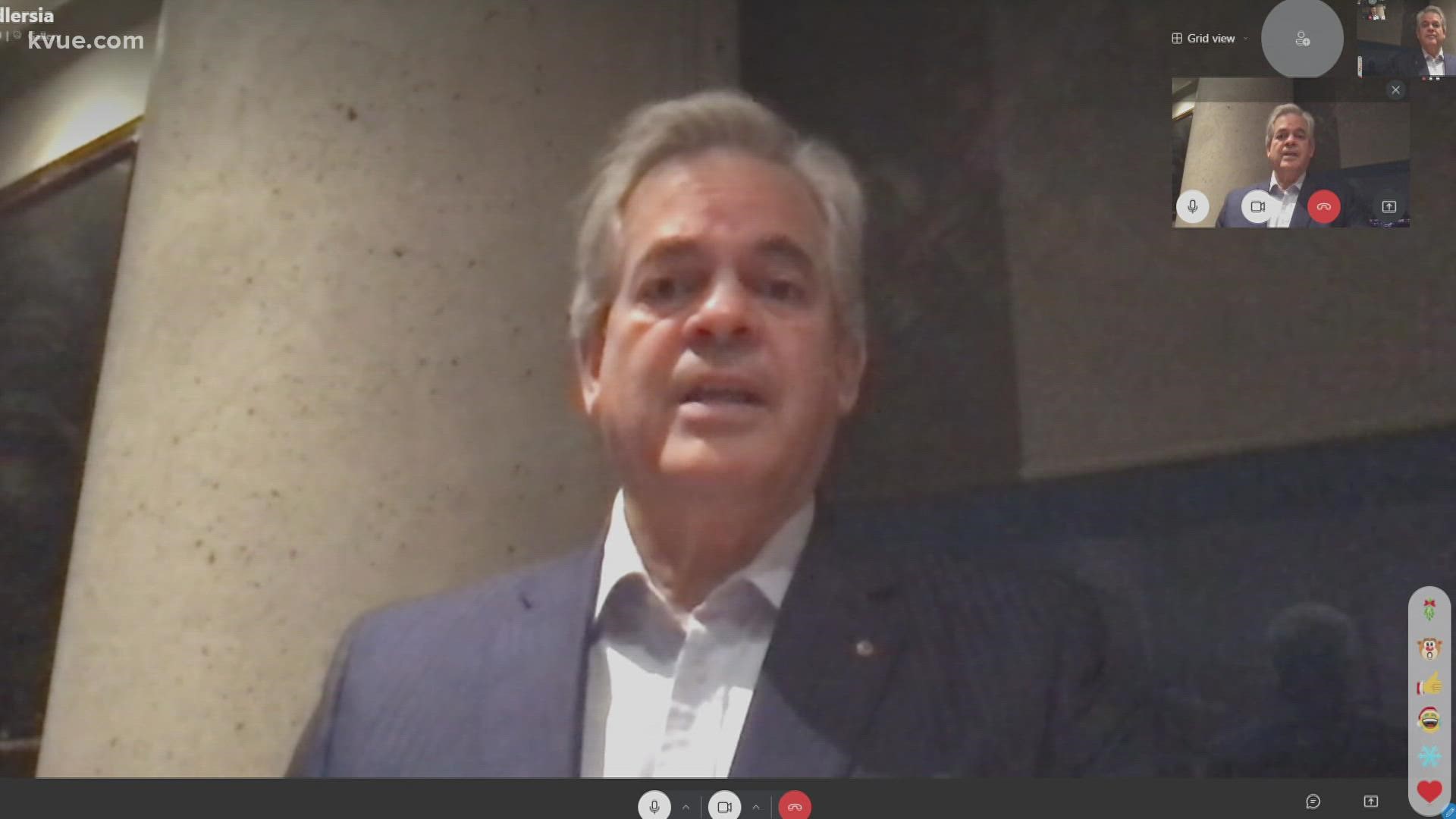AUSTIN, Texas — The end of 2021 is near. Mayor Steve Adler joined KVUE Daybreak to discuss some hot-button issues in Austin as we head into the holidays and toward the start of 2022.
Yvonne Nava: Let's talk about COVID. You know, we are still in Stage 3, omicron hasn't been detected in Austin yet – I know [it has] in Texas, but not in Austin yet. How concerned are health leaders at this point about this variant?
Austin Mayor Steve Adler: "I think everybody's concerned about the variant. It is, I think, pretty much everywhere now. It's just a question of when it's found. So we have to be careful. We're learning more about the variant. It looks as if maybe it's more infectious, maybe it doesn't have the severity, but we're trying to find that information now. But it does mean that everybody should be redoubling their efforts to make sure they're vaccinated. If they're not boosted, get it. If you're not, that's the best protection against the variant. And then please continue to wear a mask, especially indoors, if you're doing it around people [and] you don't know their vaccination status."
Nava: Yes, boosted. That was very important that our family, we got that as well. We talk about Stage 3 – what will it take, though, Mayor, to get lower into Stage 2? Do you see that maybe happening? Or maybe not until after the holidays?
Adler: "You know, my guess would be – you know, it's up to the health authority because we're being governed by the science and the data. But based on what we're seeing with a very slight increase in the number of hospitalizations, I don't see us moving to that until after the holidays. This is the time to be especially careful when we're with our families. And again, you know, out in public, [if] you don't know people's vaccination status indoors, masking's a good idea."
Nava: Over the weekend, it was cold. Had to whip out the fuzzy socks, it was so cold. You know, the majority of Central Texas ... we saw those freezing temperatures over the weekend, the majority. How far are we from being ready for a possible winter storm? And what has the City done differently to prepare? Because when it gets cold, we remember what happened back in February. How prepared are we?
Adler: "We sure do remember that, and the council has been on the [city] manager pretty hard to make sure we're in a different position going into this winter season. We've gone through multiple after-action reports from the city manager, developed a list of things that were going to be changed in terms of responsiveness, communications, availability and energy. So, I expect things to be significantly different here. I just hope that at the state level, with ERCOT, that it holds up. I wish there was more action being taken at the state level."
Nava: I know there was also a communication barrier. I'm hoping that some information will be relayed also in Spanish and other languages because that was an issue as well, right, Mayor?
Adler: "Absolutely. And I know they're working on that, and I know that will be different this year."
Nava: So, let's talk about [the] city council approving some zoning changes with the agreement that affordable homes will be built. Is this something that can be expanded and sustained?
Adler: "Well, right now, I think it's our existential challenge. You know, we've done great work with the bond election on transportation for Project Connect, on homelessness. We have people moving off the street and into housing and the summit plan's putting us on the path to reach net effective zero. The next existential challenge for us: housing affordability and housing supply. It's always been increasing, but in the last 12 months, it's just been geometric.
RELATED: Austin City Council votes to expand use of accessory apartments to develop affordable housing
I wish we could do a comprehensive zoning change because I think that's necessary to get the housing supply that we need. But given the fact that the courts have held us up on that now, we have to do those things we can get consensus on. That's what the council has been working on. There are good things to do, and it's great we're reaching consensus. They don't go as far as I would like, but we can't wait for the courts. We have to do what we can. And the council is liberalizing the ability to put auxiliary dwelling units or 'granny flats' behind homes. The council is moving forward to have more residential and commercial areas on our corridors. We're taking a look at the costs, going through the City process to minimize those so we can build supply more quickly."
Nava: All improvements. That all sounds so good. You know, we're wrapping up this year and I love to kind of reflect on the year that was. So, kind of looking ahead and looking behind us, what's something you feel the City did really well? And what do you think you all could have done a better job of?
Adler: "I think we did really well on the COVID response. The mortality rates, people dying – which is the ultimate measure – here in Austin-Travis County is half of what the state mortality rate is. If the state had the same mortality rate that we have here locally, over 30,000 Texans would still be alive. I wish we had been doing a better job on housing affordability and housing supply. And that's where we have to be turning our attention to next year in a really dramatic way."
PEOPLE ARE ALSO READING:

